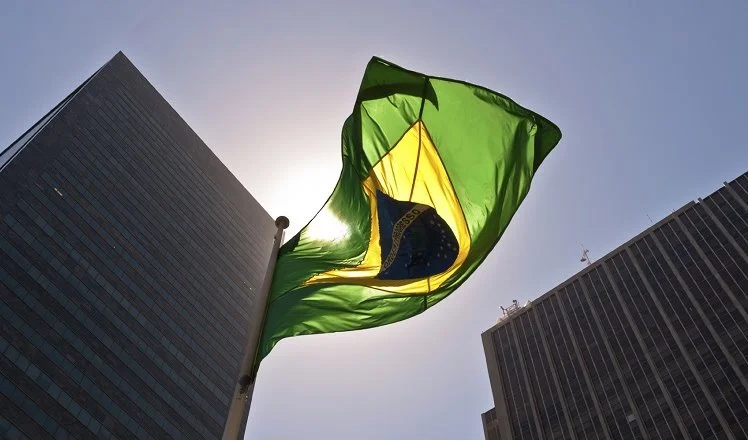
(Op-Ed Analysis) On July 9, 2025, a thunderbolt struck Brazil’s already faltering political establishment: U.S. President Donald Trump imposed a decisive 50% tariff on all Brazilian imports.
It was the strongest assertion yet that America will no longer subsidize nations it sees drifting toward authoritarianism and Chinese influence.
The Brazilian real plunged 2% within hours, markets shuddered, and Brasília was blindsided. Yet for those who have tracked Brazil’s internal drift for the past half-decade, this moment was no accident.
It was the boomerang finally coming home — the global consequence of years of authoritarian overreach by Brazil’s left-wing elite, oblivious to the seismic political shift reshaping democracies from Washington to Rome.
This tariff shock, unprecedented in modern U.S.-Brazil relations, did not occur in a vacuum. It crystallized what many warned would come to pass: the collision between Brazil’s domestic authoritarianism and the populist realignment sweeping the West.
And it is, more than anything, a sobering reckoning for a political class that has clung to power through judicial activism, censorship, and the resurrection of discredited figures, believing the global tide would never turn against them.
The Left’s Long Reign and Overreach
For decades, Brazil’s left-wing establishment – dominated by Luiz Inácio “Lula” da Silva and his Workers’ Party (PT) – wielded power with an air of impunity.
Lula’s two-term presidency (2003–2010) was hailed as a social revolution, but it also bred corruption on a historic scale.
The Car Wash scandal (Lava Jato) exposed a sprawling graft scheme involving Petrobras and construction firms like Odebrecht, ensnaring dozens of politicians across the ruling leftist coalition.
Lula himself was convicted in 2017 of bribery and money laundering – charges that landed the once-revered leader in prison in 2018. For 580 days, it seemed the mighty had fallen, punished for the very “pay-to-play” power drunkenness that critics long alleged.
How Decades of Power-Drunk Elites Are Boomeranging on Brazil. (Photo Internet reproduction)
Yet the entrenched elite was not about to cede its throne. In a stunning move in 2021, Brazil’s Supreme Federal Court STF voided all of Lula’s corruption convictions on a technicality, citing jurisdictional issues.
This controversial annulment – “shameless and senseless” to observers – resurrected Lula’s political life.
The ex-president who had been jailed as a criminal was suddenly free to run for office again, thanks to judicial maneuvers by a Supreme Court largely appointed during the PT’s long rule.
Such an outcome underscored how deeply Brazil’s highest institutions were intertwined with the old ruling class, bending the rules to restore their figurehead to power.
The message was clear: the establishment’s grip on power would not be loosened even by a corruption verdict – a hubris that would soon come back like a boomerang.
Judiciary as Enforcer: Moraes and the “Fake News” Power Grab
If Lula’s courtroom comeback symbolized the elite’s brazenness, the Supreme Court’s own behavior since 2019 has been even more alarming.
In that year, amid rising criticism of the judiciary, Justice Alexandre de Moraes spearheaded an unprecedented inquisition ironically dubbed the “Fake News” inquiry.
How Decades of Power-Drunk Elites Are Boomeranging on Brazil. (Photo Internet reproduction)
By self-initiating an investigation into alleged online disinformation, the STF stepped far beyond its traditional role, essentially granting Justice Moraes extrajudicial powers to pursue whomever he deemed a threat.
Critics note that this inquiry was “created out of thin air” – an invention with no clear limits, allowing Moraes to act as investigator, prosecutor, and judge all at once. It was an imperial power grab cloaked in the language of defending democracy.
Since then, Justice Moraes has used this expansive mandate to aggressively censor and punish voices critical of the leftist establishment.
In one striking case, he ordered the shutdown of a 30-year-old regional newspaper on the grounds of “fake news,” issuing raids and arrest warrants against journalists and even elected officials.
Opposition figures describe Moraes as a “censorship czar” enforcing the ruling elite’s will. Under his orders, social media accounts have been suspended en masse, assets frozen, and dissidents jailed – often with a mere stroke of his pen, bypassing standard due process.
The irony is palpable: for years the left accused former President Jair Bolsonaro of attacking the free press, yet it is the left’s own judicial henchman now silencing inconvenient newspapers and voices.
In the guise of combating “disinformation,” Brazil’s Supreme Court has amassed a level of power that many democracies would consider unthinkable – and it has largely been deployed against one side of the political spectrum.
Crushing the Conservative Opposition
With Lula’s return to the presidency in 2023, backed tacitly by a friendly judiciary, Brazil’s institutions turned with full force against his conservative rivals.
Bolsonaro and his supporters increasingly face legal persecution, often under broad allegations of “anti-democratic” activities.
During the 2022 campaign and its aftermath, Justice Moraes (who also headed the Superior Electoral Court) initiated a “relentless persecution” in Bolsonaro’s words.
The Supreme Court opened probes to potentially void Bolsonaro’s 2018 election victory on flimsy grounds.
At one point it even raised the specter of banning Bolsonaro from running – long before the verdict that has since materialized – on the premise of curbing “fake news”.
“They want me out of combat and Lula elected,” Bolsonaro remarked, accusing Moraes and the court of openly trying to tilt the playing field.
How Decades of Power-Drunk Elites Are Boomeranging on Brazil. (Photo Internet reproduction)
Perhaps the most brazen move came in early 2022, when Moraes ordered a nationwide blackout of the Telegram messaging app – a platform popular with Bolsonaro’s base – because the company had not promptly obeyed court orders to remove certain content.
The ban was reversed only after Telegram complied with draconian demands, including deleting a post by Bolsonaro and implementing new content controls.
To many, this confirmed that Brazil’s high court was willing to suspend basic freedoms to stifle the right. Bolsonaro decried the temporary shutdown of Telegram as “an attack on the freedom” of Brazilians.
Indeed, such tactics – banning apps, gagging lawmakers, threatening media – have become tools of choice for a judiciary aligned with Brazil’s left-wing elite.
Moraes has even fined U.S. tech firms like Twitter (X) and Rumble millions of dollars for refusing to censor content, moves the U.S. judiciary later struck down as unenforceable overreach.
Inside Brazil, the Supreme Court’s heavy-handed approach has polarized the public. While many weary of misinformation support firm action, a growing number see blatant double standards and partisan zeal.
A recent poll found nearly half of Brazilians distrust the STF’s impartiality. Moraes’ crusade has “unchecked power to target Lula’s opponents,” critics warn, with right-wing figures disproportionately punished under broadly-defined offenses.
In short, Brazil’s judicial branch – long esteemed as guardian of the Constitution – is now widely viewed as a political actor, weaponized to cement the ruling elite’s grip on power.
The Questionable 2022 Election and Public Backlash
These tensions exploded into the open around the 2022 presidential election, one of the most divisive in Brazilian history.
Lula’s narrow victory (by 1.8% of votes) was immediately met with mass outrage among Bolsonaro’s supporters, who alleged the contest was rigged.
Millions of ordinary Brazilians simply did not believe Lula truly won, openly talking of “electoral fraud” on social media and in street protests.
Within hours of the result, spontaneous demonstrations erupted: truckers and farmers blocked highways across dozens of states, and crowds rallied in front of military barracks, urging the army to intervene against what they called a “sham election”.
Rather than seek transparency or calm the waters, the institutions doubled down. Justice Moraes, in his role overseeing the electoral court (TSE), moved swiftly to censor discussion of election irregularities.
How Decades of Power-Drunk Elites Are Boomeranging on Brazil. (Photo Internet reproduction)
According to reports, he even ordered internet service providers to throttle social media on election night to “prevent the largest demonstration in Brazil’s history” – an extraordinary and unverified step that nonetheless spread as rumor among protestors.
He authorized state governors to use force to clear roadblocks and threatened to jail organizers of the protests. Bolsonaro, for his part, trod carefully – he never explicitly conceded, but he also avoided fully endorsing the protests, likely fearing imprisonment if he was seen as instigating them.
The net effect was to convince Bolsonaro’s base that the entire system was arrayed to install Lula at any cost.
Far from quelling “disinformation,” the authoritarian response only fueled popular anger and mistrust: as one demonstrator told the press, “It is not the STF’s job to speak for the President… He must say himself if he agrees with the outcome”.
To this day, a significant portion of the electorate doubts the official 2022 result, a legitimacy crisis that Brazil’s rulers seem unable or unwilling to address through dialogue rather than repression.
Exiles, Arrests, and the Climate of Fear
Under these conditions, Brazil’s conservative camp has felt increasingly under siege. Prominent right-wing politicians, journalists, and even judges have fled into exile, seeing no future under what they call a judicial dictatorship.
Take Carla Zambelli, a firebrand congresswoman and Bolsonaro ally: in 2023 she was charged for a bizarre episode of pursuing a man with a firearm on election eve, as well as an alleged hack aimed at embarrassing Justice Moraes.
Facing a harsh sentence of ten years, Zambelli slipped out of Brazil in 2025 and surfaced in Europe (she holds Italian citizenship). The Supreme Court promptly issued a warrant and sought Interpol’s help to haul her back.
Rather than surrender, she’s applying for asylum and telling the world she’s a political persecuted. She is hardly alone.
Her departure “follows a growing trend among Brazil’s conservative figures who claim judicial persecution,” notes one account. Zambelli herself invoked her dual citizenship as a shield and openly challenged the fairness of her trial.
Similarly, Eduardo Bolsonaro – son of the former president and a federal lawmaker – left Brazil for the United States in early 2025, citing an onslaught of investigations with political motives.
Eduardo hasn’t been formally charged with a crime, but he preemptively sought refuge after Brazil’s Congress discussed stripping his immunity and seizing his passport.
Power Shift on Brazil’s Right: Eduardo Bolsonaro’s Exit Sparks Nikolas Ferreira’s Rise. (Photo Internet reproduction)
From Florida, he’s lobbying U.S. politicians to act against what he calls Brazil’s “judicial tyranny”, even urging sanctions on Justice Moraes, which have since materialized.
His self-imposed exile was triggered after the Prosecutor General targeted him for supposedly “undermining democratic institutions” – merely because he met U.S. lawmakers and decried censorship back home.
Beyond politicians, conservative media voices have also been driven out. Journalist Allan dos Santos, whose online channel criticized Lula and the Supreme Court, had his bank accounts frozen and social media banned at Moraes’ orders.
He fled to the U.S. after an arrest warrant accused him of “disinformation” related to the 2022 election. (A U.S. judge later refused his extradition, citing First Amendment protections.)
Other right-leaning influencers like a former judge, Ludmila Lins Grilo, and a popular podcaster, Bruno “Monark” Aiub, left Brazil as well, saying they feared prosecution for their speech.
This conservative exodus is unprecedented in modern Brazilian history. Many of those who left argue they only exercised free speech yet face draconian penalties at home, with courts blocking their online accounts and threatening jail time.
Critics of the Supreme Court compare its methods to authoritarian regimes, noting how conveniently its crackdowns align with the ruling party’s interests.
Meanwhile, the Court’s supporters insist such tough measures are necessary to “protect democracy” from fake news and extremist plots – a rationale that rings hollow to roughly one-third of Brazilians who identify with the right and now see their leaders either in jail, on trial, or in exile.
The result is a country profoundly divided and a liberal elite dangerously out of touch with a large segment of its people.
Blindness to a Global Paradigm Shift
Brazil’s power-drunk establishment appears oblivious to a seismic political shift that has been unfolding across the democratic world.
As they double down on silencing domestic dissent, they ignore how voters elsewhere are flipping the script on elites and insurgents.
Donald Trump’s populist campaigns in 2016 and 2024 shifted the direction of U.S. politics by defeating the Democratic establishment’s preferred candidates.
These changes are steering U.S. political dynamics into new territory, with potential effects across the broader Western world.
In Europe, one country after another has seen outsider right-wing movements surge. “Sweden confirmed the paradigm shift” last year, wrote one commentator, noting how a nationalist party came in second for the first time.
In Italy, Giorgia Meloni won power on a platform defying the EU elites – “the first defeat of globalism in Western Europe,” as one op-ed proclaimed.
Once-marginal figures like Marine Le Pen in France now poll competitively for the presidency, while Germany’s taboo-breaking AfD party is scoring record highs in recent elections.
This “reactionary turn” that began in the West with Brexit and Trump’s victory has only accelerated.
The common thread is that old ruling classes are becoming the new pariahs to frustrated publics, and yesterday’s pariahs – nationalist, populist, anti-establishment leaders – are becoming the new mainstream.
Yet in Brasília, it’s as if the clock stopped in the era of unchallenged liberal internationalism. Lula and his circle seem blind to this epochal change, behaving as though branding opponents as “fascists” and “extremists” will automatically marginalize them.
That tactic might have still worked 2 years ago, but today it rings empty. When half the country is upset at your governance, demonizing and censoring them only fuels the fire.
Brazil’s left-wing elite has wrapped itself in a smug bubble, congratulating itself on defeating “authoritarianism” at home while populism sweeps the globe.
In reality, by refusing to allow healthy debate and democratic competition, they are incubating the very discontent that could one day sweep them away. The boomerang is coming around.
Brazil: A Pariah of the New West, a Client of China?
This denial of reality doesn’t just risk domestic upheaval – it carries geopolitical consequences. Under Lula, Brazil has tilted markedly toward authoritarian great powers like China, even as much of the West grows wary of Beijing.
In the past two years, Lula’s government enthusiastically courted Chinese investment and political support, to the point that observers quip “Lula’s Brazil has become China’s CCP poster boy.”
How Lula’s Brazil Has Become China’s CCP Poster Boy. (Photo Internet reproduction)
The numbers bear this out: China now buys 30% of Brazil’s exports (triple the U.S. share) and has stakes in strategic sectors from energy to mining to telecom.
In 2024 alone, bilateral trade hit $188 billion, a record, and Beijing’s state companies are building everything from power grids to railways on Brazilian soil.
Lula’s administration touts these ties as pragmatic, but critics warn that Brazil is trading its strategic autonomy for short-term gains, becoming economically dependent on the Chinese Communist Party’s good graces.
The danger is that Brazil’s elite may wake up to find their country reduced to a raw-material appendage of China, with key industries and infrastructure effectively controlled by a foreign power.
At the same time, by antagonizing a large swath of its own people and aligning with leftist authoritarianism, Brazil’s establishment is alienating natural allies in the democratic world.
Nowhere is this more evident than with the United States. Under President Biden, U.S.-Brazil relations remained cordial. However, with the return of Trump, Brazil could soon find itself sidelined.
In Washington, an emerging chorus of influential figures sees Brazil’s Supreme Court as an out-of-control menace trampling free speech.
U.S. lawmakers have openly discussed sanctioning Justice Moraes for human rights abuses (via the Global Magnitsky Act) and have called Brazil’s current government “a weapon to crush opposition” and even to “rig” future elections.
Indeed, by July 2025 the friction had reached unprecedented levels: U.S. officials threatened sweeping tariffs on Brazilian imports – a fivefold hike – explicitly as a response to Moraes’ censorship of American tech platforms and the “witch hunt” against Bolsonaro’s camp.
In a scenario unthinkable a few years ago, Brazil is now risking outcast status in Washington. Lula’s response has been defiant nationalist rhetoric, vowing that no foreign power should comment on Brazil’s institutions.
Such bravado may play well at home, but it does not erase the reality that Brazil is isolating itself from the new Western consensus.
If Trump escalates his stance, Brazil could face harsher trade penalties and a diplomatic freeze just as its economic dependence on China reaches new heights—a risky predicament for the country.
A Nation at a Crossroads – Revolution or Subjugation
Brazil stands at an historic crossroads. The left-wing establishment, drunk on power after years of dominance, has thus far succeeded in clinging to its throne – jailing opponents, overriding checks and balances, and even resurrecting its patron saint Lula against the odds.
But these very actions are beginning to rebound against the country. They have galvanized a substantial opposition at home, disillusioned by double standards and democratic deficits.
They have also put Brazil out of step with global currents and on a collision course with key partners. The old order is teetering: across the world the script has flipped, and Brazil’s rulers may be the last to realize it.
If the liberal elite here remains blind and deaf to calls for change, the outcome could be dramatic.
Brazil may need a political revolution – hopefully a peaceful, electoral one – to realign its governance with the popular will and with the new geopolitical reality.
In practical terms, that means restoring genuine separation of powers (reining in an activist Supreme Court), ending one-sided persecution in the name of “democracy,” and respecting the voice of all citizens, not just those who support the regime.
How Decades of Power-Drunk Elites Are Boomeranging on Brazil. (Photo Internet reproduction)
It may mean the rise of new anti-establishment leaders who can do to the PT what Meloni did to Italy’s left or what Trump did to the Democrats. Nothing less will break the cycle of impunity and distrust that now plagues Brazil.
The alternative is grim: a Brazil that, through continued arrogance and repression, becomes the “new black sheep” in the eyes of an ascendant populist West and simultaneously the client state of an ambitious China – in effect, shunned by one side and shackled to the other. Such a fate would be bitter indeed for a proud nation.
The time has come for Brazil’s elites to sober up from their decades-long power binge, or else face the whirlwind of the boomerang they themselves have thrown.
Sources: Brazilian and international news reports; The Rio Times analyses and op-eds, Reuters and others.





